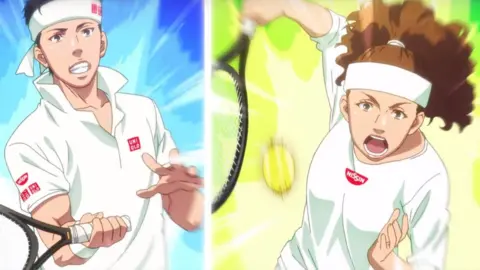Naomi Osaka: Tennis star responds to 'whitewashed' ad
 Nissin
NissinTennis star Naomi Osaka has responded after one of her sponsors was accused of "whitewashing" her in a drawing, saying: "I'm tan, it's pretty obvious."
In an animated advert, noodle company Nissin was accused of portraying the Haitian-Japanese sports personality with white skin and light brown hair.
The company later took the campaign off the air and issued an apology for "not [being] sensitive enough".
Osaka told a press conference that Nissin also apologised to her directly.
"I've talked to [Nissin] and they've apologised," she told journalists at the Australian Open. "It's obvious, I'm tan. It's pretty obvious."
She added: "I don't think they did it on purpose to be 'whitewashing' or anything, but I definitely think that, next time they try to portray me or something, I feel like they should talk to me about it."
 Getty Images
Getty ImagesIt is not the first time that Osaka has found her victories on the court overshadowed by a row over a cartoon.
In September 2018, an Australian cartoonist depicted Osaka as a blonde-haired, white-skinned woman in a controversy that took weeks to die down.
Responding to the latest backlash on Wednesday, a Nissin spokesperson said there was "no intention of whitewashing". "We accept that we are not sensitive enough and will pay more attention to diversity issues in the future."
The row has once again cast a light on the issue of race and discrimination in Japan.
 Nissin
NissinJapan is a country which is - even now - extremely homogenous. The issue of race and racism, therefore, is perhaps not as obvious to people on a daily basis.
Today, attitudes - and the country's homogeneity - are changing. About one in every 50 babies born in Japan are mixed race like Osaka, who was mainly raised in the US but born in the city of Osaka.
Yet even with stars like 21-year-old Osaka - not to mention the sprinter Asuka Cambridge, baseball player Yu Darvish and judo star Mashu Baker - the "hafu" still face prejudice. "Hafu" is the Japanese word for mixed race.
